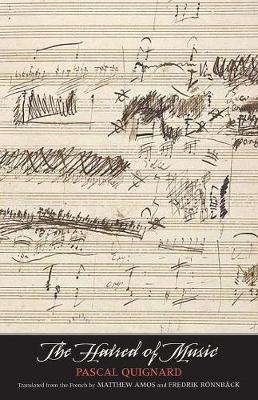The Margellos World Republic of Letters
1 total work
How does a man who once adored music beyond measure come to revile it as a form of tyranny?
Throughout Pascal Quignard's distinguished literary career, music has been a recurring obsession. As a musician he organized the International Festival of Baroque Opera and Theatre at Versailles in the early 1990s, and thus was instrumental in the rediscovery of much forgotten classical music. Yet in 1994 he abruptly renounced all musical activities. The Hatred of Music is Quignard's masterful exploration of the power of music and what history reveals about the dangers it poses.
From prehistoric chants to challenging contemporary compositions, Quignard reflects on music of all kinds and eras. He draws on vast cultural knowledge-the Bible, Greek mythology, early modern history, modern philosophy, the Holocaust, and more-to develop ten accessible treatises on music. In each of these small masterpieces the author exposes music's potential to manipulate, to mesmerize, to domesticate. Especially disturbing is his scrutiny of the role music played in the concentration camps of Nazi Germany. Quignard's provocative book takes on particular relevance today, as we find ourselves surrounded by music as never before in history.
Throughout Pascal Quignard's distinguished literary career, music has been a recurring obsession. As a musician he organized the International Festival of Baroque Opera and Theatre at Versailles in the early 1990s, and thus was instrumental in the rediscovery of much forgotten classical music. Yet in 1994 he abruptly renounced all musical activities. The Hatred of Music is Quignard's masterful exploration of the power of music and what history reveals about the dangers it poses.
From prehistoric chants to challenging contemporary compositions, Quignard reflects on music of all kinds and eras. He draws on vast cultural knowledge-the Bible, Greek mythology, early modern history, modern philosophy, the Holocaust, and more-to develop ten accessible treatises on music. In each of these small masterpieces the author exposes music's potential to manipulate, to mesmerize, to domesticate. Especially disturbing is his scrutiny of the role music played in the concentration camps of Nazi Germany. Quignard's provocative book takes on particular relevance today, as we find ourselves surrounded by music as never before in history.
